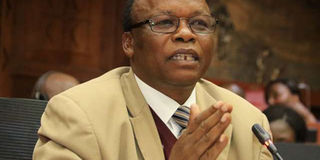Preach peace but ensure the 2017 polls are also credible

Prof Johnson Masai speaks before the Independent Electoral and Boundaries Commission selection panel, for the position of commissioner, at Parliament Buildings on December 1, 2016. The candidates for chair and commissioners for the electoral commission do not generate much hope and confidence. PHOTO | JEFF ANGOTE | NATION MEDIA GROUP
What you need to know:
- The Supreme Court still retains at least two members who tried to subvert the Constitution for their own ends.
- But I am also for just, fair and credible elections that we can all accept and which can be the basis of our moving forward.
In 2013, many observers declared the elections ‘peaceful’ especially compared to 2007.
But they were not peaceful: more than 400 people were killed in election-related violence and after the woeful judgment by the Supreme Court.
Our media, under the spell of the “peace at all costs” spin-masters, downplayed this violence but many residents of Tana River, Kisumu and parts of northern Kenya have a different story to tell.
The role of security forces in the election related violence — by action and omission — is telling and ominous.
Moreover, we all wanted to avoid a repeat of 2007 and there were factors in place that made us hopeful.
There was an IEBC that had some credibility, despite its obvious willful negligence.
And, crucially, there was a Supreme Court enjoying massive public trust and confidence, mostly because of the history and personal credibility of then Chief Justice Willy Mutunga.
These factors no longer exist, and no amount of spin can restore similar levels of trust before the elections.
The candidates for chair and commissioners for the electoral commission do not generate much hope and confidence.
And besides, it is too late for even credible and competent officials to make audit, and reverse, the “preparations” cemented by a commission (and staff) that engenders a sense of partisanship.
AJUST PROCESS
The Supreme Court still retains at least two members who tried to subvert the Constitution for their own ends.
And the new chief justice is basically unknown outside the Seventh Day Adventist.
We have no inkling of his spine, his independence or his commitment to transformation in Kenya.
Without a process that repudiates the 2013 judgment, it is unlikely there will be much enthusiasm to petition the Supreme Court after the election, putting us back to 2007.
It is thus disappointing that Kepsa is resorting to the 2013 tactics of “peaceful” elections at all costs, and with no mention of credible, acceptable, fair and competent elections.
Don’t get me wrong: I am for peaceful elections.
But I am also for just, fair and credible elections that we can all accept and which can be the basis of our moving forward.
Indeed, credible elections necessarily mean peaceful elections, but they go beyond that.
Focusing on credible elections means including issues that are difficult but non-partisan.
For instance: are the youth fairly and equally given ID cards even in the most inaccessible parts of Kenya?
Or do IDs favour certain regions as InformAction has shown recently?
Are there genuine efforts to not only register new voters but also forensically audit the old registers (since they are many despite the constitutional requirement for one register)?
CORPORATES' INPUT
Who are the suppliers of the electronic safeguards built into the electoral system?
Are they tamper-proof and transparent? Is the electoral commission server linked to one of the candidates?
There are new trends in the corporate world that Kepsa would be wise to emulate.
In 2013, Andy Hall, a human rights researcher was charged with two criminal and two civil charges in Thailand following his role in investigating and documenting the role of migrant workers in Thailand’s booming pineapple and tuna fish industries.
The charges against him were intended to send a message not to question the lucrative export business in pineapples and tuna fish despite the violation of rights.
To the surprise of many, the Thai Tuna Industry Association, seeking to rectify its image, paid Mr Hall’s bail, and there has been significant corporate support for Mr Hall.
Maybe the next time peaceful protesters are charged for protesting against corruption, Kepsa and some corporates, who speak loudly against corruption, could put up bail.
Similarly, had jewellers such as Leber Jewellers, Brilliant Earth and Tiffany and Co, stepped in, Rafael Marques would be in a tiny torturous cell in Angola following the publication of his book in 2011 linking military generals to abuses and atrocities in diamond rich areas in Angola.
The point is that the corporate world can and could do more in Kenya than it is doing.
And shifting its focus from a partisan “peaceful” election theme to a non-partisan “credible election” focus could be a first step.





